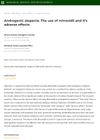 1 citations,
December 2005 in “임상약리학회지”
1 citations,
December 2005 in “임상약리학회지” HDMHG0401-10 treatment significantly improved hair count and was better than a placebo in reducing hair loss in men with hereditary hair loss, with no major side effects.
[object Object]  5 citations,
January 2018 in “Skin Pharmacology and Physiology”
5 citations,
January 2018 in “Skin Pharmacology and Physiology” Curcuma aeruginosa extract lotion significantly reduces underarm hair growth.
 September 2022 in “Women's healthcare”
September 2022 in “Women's healthcare” PCOS is managed by lifestyle changes and personalized medication to improve symptoms and fertility.
 53 citations,
March 2010 in “British Journal of Dermatology”
53 citations,
March 2010 in “British Journal of Dermatology” Alopecia common in teens, may indicate endocrine issue, minoxidil effective treatment.
 June 2024 in “Sohag Medical Journal”
June 2024 in “Sohag Medical Journal” Vitamin D is linked to hair health, but more research is needed for its use in treating female hair loss.
![Activity of 17β-(N-Alkyl/Arylformamido) and 17β-[(N-Alkyl/Aryl) Alkyl/Arylamido]-4-Methyl-4-Aza-5α-Androstan-3-Ones as 5α-Reductase Inhibitors in the Hamster Flank Organ and Ear](/images/research/861159f1-7bd4-420c-a16b-4829458efe68/small/15592.jpg) 10 citations,
August 1998 in “Journal of Investigative Dermatology”
10 citations,
August 1998 in “Journal of Investigative Dermatology” The compounds tested could potentially treat hair loss and alopecia.
 August 2024 in “Frontiers in Pharmacology”
August 2024 in “Frontiers in Pharmacology” Antibody treatments show promise for hair loss but need more research.
 20 citations,
August 2015 in “International Journal of Molecular Medicine”
20 citations,
August 2015 in “International Journal of Molecular Medicine” Human placental extract may help hair growth by affecting certain cell signals and could be more effective with minoxidil.
 13 citations,
October 1993 in “International Journal of Dermatology”
13 citations,
October 1993 in “International Journal of Dermatology” Minoxidil effectively promotes hair regrowth in younger patients with small balding areas.
 187 citations,
December 2005 in “Experimental Dermatology”
187 citations,
December 2005 in “Experimental Dermatology” Estrogens can improve skin aging but carry risks; more research is needed on safer treatments.
 June 2024 in “Computational and Structural Biotechnology Journal”
June 2024 in “Computational and Structural Biotechnology Journal” Multi-omics techniques help understand the molecular causes of androgenetic alopecia.
 41 citations,
September 2011 in “Journal of Ethnopharmacology”
41 citations,
September 2011 in “Journal of Ethnopharmacology” Panax ginseng extract helps mice grow hair.
Scalp med(R) effectively and safely improves hair count and thickness in men with androgenetic alopecia.
 5 citations,
January 2020 in “Journal of Dermatology and Dermatologic Surgery”
5 citations,
January 2020 in “Journal of Dermatology and Dermatologic Surgery” Caffeine may benefit skin and hair health but more research is needed to confirm its effectiveness in dermatology.
 April 2024 in “Archiv EuroMedica”
April 2024 in “Archiv EuroMedica” Platelet-Rich Plasma therapy helps increase hair density and regrowth for some types of hair loss.
 May 2022 in “Journal of the Egyptian Women's Dermatologic Society (Print)”
May 2022 in “Journal of the Egyptian Women's Dermatologic Society (Print)” Women's hair loss can be due to hormonal changes and various conditions, with treatments focusing on stopping progression and managing symptoms.
 July 2021 in “Research, Society and Development”
July 2021 in “Research, Society and Development” Minoxidil is effective and safe for hair growth in Androgenetic Alopecia, with manageable side effects.
 August 2024 in “Journal of Cosmetic Dermatology”
August 2024 in “Journal of Cosmetic Dermatology” Injectable treatments can effectively and safely improve hair growth in adults with androgenetic alopecia.
1 citations,
November 2023 in “Journal of Ayurveda and Integrative Medicine” Ashwagandha serum improves hair health and quality of life in people with hair loss.
 September 2023 in “Stem Cells International”
September 2023 in “Stem Cells International” Substances from fat-derived stem cells can promote hair growth and counteract hormone-related hair loss by activating a key hair growth pathway.
January 2021 in “International Journal of Research in Dermatology” Combination therapies are more effective for treating androgenetic alopecia than single treatments.
 68 citations,
January 2015 in “Indian Journal of Dermatology”
68 citations,
January 2015 in “Indian Journal of Dermatology” Microneedling can effectively promote new hair growth in men with hair loss who didn't improve with traditional treatments.
 December 2024 in “Revista Eletrônica Perspectivas da Ciência e Tecnologia - ISSN 1984-5693”
December 2024 in “Revista Eletrônica Perspectivas da Ciência e Tecnologia - ISSN 1984-5693” Polymeric nanoparticles could improve hair loss treatments by delivering drugs more effectively to hair follicles.
 25 citations,
January 2009 in “Oral and Maxillofacial Surgery Clinics of North America”
25 citations,
January 2009 in “Oral and Maxillofacial Surgery Clinics of North America” Successful hair transplant surgery depends on careful patient selection, proper surgical plan and technique, and attentive aftercare.
 5 citations,
October 2013 in “Clinics in Plastic Surgery”
5 citations,
October 2013 in “Clinics in Plastic Surgery” Hair transplant improves with regenerative medicine and FUE technique.
 18 citations,
March 2014 in “Drug Development and Industrial Pharmacy”
18 citations,
March 2014 in “Drug Development and Industrial Pharmacy” New gel formulas without ethanol and propylene glycol, containing a minoxidil-methyl-β-cyclodextrin complex, have been created for treating hair loss.
[object Object]  3 citations,
November 2018 in “Journal of cellular physiology”
3 citations,
November 2018 in “Journal of cellular physiology” Serenoa repens and N-acetyl glucosamine/milk proteins complex may help with hair growth and prevent hair loss.
 10 citations,
August 2018 in “Dermatologic Surgery”
10 citations,
August 2018 in “Dermatologic Surgery” Laser treatment improves hair density and increases growth factors in androgenetic alopecia.
 October 2024 in “International Journal of Pharmaceutical Sciences Review and Research”
October 2024 in “International Journal of Pharmaceutical Sciences Review and Research” A 5% minoxidil spray could effectively treat male baldness with fewer side effects and better patient comfort.
 56 citations,
January 2021 in “Clinical and Experimental Medicine”
56 citations,
January 2021 in “Clinical and Experimental Medicine” The document concludes that while there are various treatments for Alopecia Areata, there is no cure, and individualized treatment plans are essential due to varying effectiveness.





![Activity of 17β-(N-Alkyl/Arylformamido) and 17β-[(N-Alkyl/Aryl) Alkyl/Arylamido]-4-Methyl-4-Aza-5α-Androstan-3-Ones as 5α-Reductase Inhibitors in the Hamster Flank Organ and Ear](/images/research/861159f1-7bd4-420c-a16b-4829458efe68/small/15592.jpg)




















